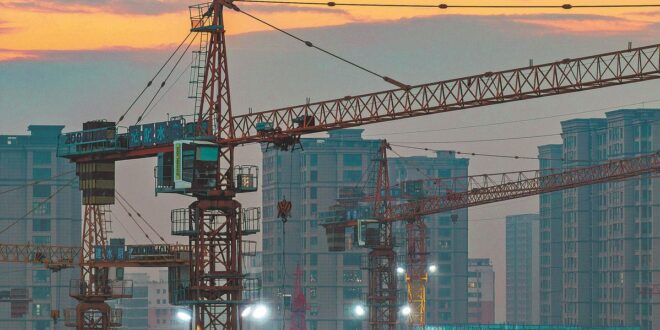THERE is a pressing need for the central government to provide funding support for the resolution of real estate developer debt risk as it remains the biggest soft spot in China’s economy, experts at a top think tank said on Monday.
Zhang Bin, a senior researcher at the China Finance 40 Forum think tank, said the Chinese economy has seen positive changes in the first quarter as industrial production accelerated, exports expanded and consumer sentiment improved.
Addressing CF40’s quarterly macroeconomic report release on Monday, Zhang said that China’s first-quarter real GDP growth of 5.3 percent has exceeded the annual target of about 5 percent.
However, the report said that as inflation remained low, nominal economic growth was still relatively low at 4.2 percent year-on-year in the first quarter, even below the 4.6 percent recorded in 2023. Generally speaking, a nominal growth rate equals the real growth rate plus inflation.
This means that corporates and households still face sluggish income growth and relatively weak sentiment, said Zhang, who is also a member of the 14th National Committee of the Chinese People’s Political Consultative Conference, the country’s top political advisory body.
“To date, we’ve not overcome insufficient demand and subdued inflation,” Zhang said, adding that the biggest downside risk arises from the real estate sector due to developers’ lingering cash flow issues and growing debt pressures.
China’s growth in the consumer price index, a main gauge of inflation, stood at zero year-on-year in the first quarter, while investment in real estate development slumped 9.5 percent, the National Bureau of Statistics said.
Not only has investment in property proved a major drag on economic growth, Zhang said, but the sector’s downturn has intensified fiscal difficulties for some local governments and restricted growth in fiscal spending.
The “whitelist” approach in place, which is aimed at providing selected real estate projects with sufficient lending, will likely reap some outcomes in easing developers’ cash flow stress, but may not fully resolve the issue as banks need to be responsible for the credit quality of their loans, he said.
To further address the issue, Zhang said that there is an urgent need for the central government to promote asset restructuring among major distressed real estate companies, including perhaps devising an asset disposal scheme and providing funding support via measures like buying up debt.
“Developed countries have relevant experience that China can reference. The resolution of the issue cannot be delayed any further and requires prompt action,” Zhang said, adding that real estate is systematically important for the economy and local governments alone are not capable of resolving the sector’s issue.
The CF40 report released on Monday also stressed the need to facilitate local governments extending their outstanding debt to ensure a stable cash flow condition, while citing the risk of a potential escalation of trade frictions.
Guo Kai, executive president of the CF40 Institute — a research institute affiliated with the forum — said the potential of another round of trade frictions is “a risk that cannot be overlooked”, which could significantly disrupt China’s export growth, possibly in the second half of the year or the first half of next year.
Zhang added that further interest rate cuts are necessary to reduce mortgage rates while restrictions on housing purchases should be lifted where possible to boost residential property demand.
Both China’s one-year and over-five-year loan prime rates, the market-based benchmark lending rates, remained unchanged from the previous month on Monday, after the over-five-year LPR, which serves as the mortgage rate benchmark, dropped by 15 basis points in February to 3.95 percent.
Pan Gongsheng, governor of the People’s Bank of China, the country’s central bank, said last week that the PBOC has strengthened countercyclical adjustments to create a sound monetary and financial environment for economic recovery. – China Daily/ANN
 BeritaKini.biz Berita Viral Terkini di Malaysia
BeritaKini.biz Berita Viral Terkini di Malaysia





